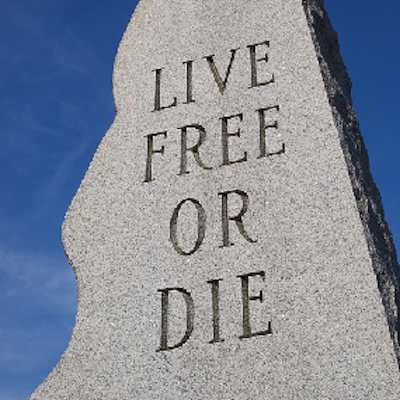Leonardo Angiulo: Dissecting the Proposed MA Firearms Legislation
Monday, July 14, 2014
Massachusetts is known for several things, but firearm ownership is not one of them. Recent legislation from the Massachusetts House of Representatives may not improve opinions of the state among gun owners in the region but does, according to advocacy groups on both sides of the issue, put residents in a fair position. The name of the House bill in question places the intention of legislators in context. Entitled “An Act relative to the reduction of gun violence,” the bill includes amendments to existing statutes that change both practice and policy in the Commonwealth.
As the law exists now, there are three levels of gun ownership in Massachusetts. First, are firearm identification (FID) cards that allow people to own things like rifles, shotguns and mace. The other two levels of ownership are known as class A and class B licenses to carry. The major difference between the two is that class B license holders cannot carry concealed firearms and are not allowed to own large capacity firearms. The proposed legislation does not change this basic structure, but does affect subtle policy shifts with significant impact.
Parsing the Policy Shifts
First and foremost are the bill's efforts at suicide prevention. The proposed new law includes education requirements for teachers to encourage awareness and early intervention for troubled young people. In addition to prevention efforts, a reporting requirement is also formed to collect and analyze data. Should the proposed legislation pass, if a suicide involves the use of a firearm, then certain information relative to the decedent and the gun will be recorded. The information in question includes the length of time between purchase and death, lawfulness of ownership, record of past suicide attempts and record of past mental health treatment of the decedent.
GET THE LATEST BREAKING NEWS HERE -- SIGN UP FOR GOLOCAL FREE DAILY EBLASTLooking at these proposed additions, one might see a legitimate public policy concern. Namely, those suffering from mental illness should be protected and who better to do so than public servants, like educators, who see them everyday. The collection of information, on the other hand, raises some questions. Rather than being a preventative measure, the formation of a database tends to show the legislature has an interest in learning more about patterns in social behavior. If that data tends to show a correlation between a public harm, such as suicides occurring close in time to firearm purchases, and existing statutes then further amendments to gun ownership laws may be reasonably anticipated.
The bill that left the house and was referred to the Massachusetts Senate included some new penalties for existing laws. Take for example proposed additions to MGL c. 140 sec. 129C that amend reporting requirements for lost or stolen firearms. As it exists now, an owner can face fines for both first and second offenses of failing to report when a gun goes missing. The proposed language increases the potential fines for initial offenses and includes incarceration for third or subsequent offenses. In both new and old versions, failing to report missing firearms, even once, is a basis for suspension or permanent revocation of a license to carry or a firearm identification card.
FID cards under the current law are “shall” issue. This means that unless a person is disqualified, by a conviction as an example, then they should get their firearms identification card. The proposed law, by contrast, keeps the “shall” issue language, but adds new discretion for licensing authorities. As proposed, the bill would allow a decision about a candidate's suitability to hold an FID card based on information that a person is a public safety risk. Exactly what kind of information can be relied on is defined as either “reliable and credible” or “existing factors that suggest” a card holder could be a threat.
As the bill travels through the Senate and towards the Governor's desk there remains time for citizens of the Commonwealth to make their voices heard. Whether people support or object to the bill they have equal opportunity to be heard. All they have to do is say something.
Leonardo Angiulo is an attorney with the firm of Glickman, Sugarman, Kneeland & Gribouski in Worcester handling legal matters across the Commonwealth. He can be reached by email at [email protected].
Related Slideshow: The Influence of Gun Money in New England States
New Data from The Sunlight Foundation shows state-by-state breakdowns for donations to groups on both sides of the gun debate. The money went toward candidates, political parties, and political action committees (PACs), but doesn't include donations to independent or so-called “super PACs”.
See how much money went to candidates in each of the New England States in the slides below.
Related Articles
- Leonardo Angiulo: What You May Not Know About The DOMA Decision
- Leonardo Angiulo: What’s Next For America’s Voting Rights Act
- Leonardo Angiulo: Who Wins in the NFL Concussion Settlement?
- Leonardo Angiulo: Why They Don’t Have The Death Penalty in Mass.
- Leonardo Angiulo: Aaron Hernandez Should Probably Lawyer Up
- Leonardo Angiulo: How Much Privacy Did You Lose Last Week? A Lot.
- Leonardo Angiulo: Something To Be Proud Of On Independence Day
- Leonardo Angiulo: MA Court Takes Hit of Justice in Marijuana Rulings
- Leonardo Angiulo: This Is Our City, You Play By Our Rules
- Leonardo Angiulo: Combating the Effects of Heroin Addiction
- Leonardo Angiulo: How State Law Can Be Used To Promote Clean Energy
- Leonardo Angiulo: US Incarceration Rate May be Unsustainable
- RI’s Changing Demographics – An Economic Opportunity
- Leonardo Angiulo: U.S. Supreme Court Renews 2nd Amendment Debate
- NEW: Rhode Island’s Changing Media Landscape
- Leonardo Angiulo: A Good Day for FBI, A Bad Day for Politicians
- Leonardo Angiulo: Dissecting the Proposed MA Firearms Legislation
- Angiulo: Supreme Court Unanimous on I.R.S. Summons and Scrutiny
- Angiulo: Supreme Court Shuts Down Innovative Aereo TV Service
- Leonardo Angiulo: Citizens Recording Official Police Business
- Leonardo Angiulo: Supreme Court Rules Raging Bull Lawsuit to Go Another Round in Federal Court










